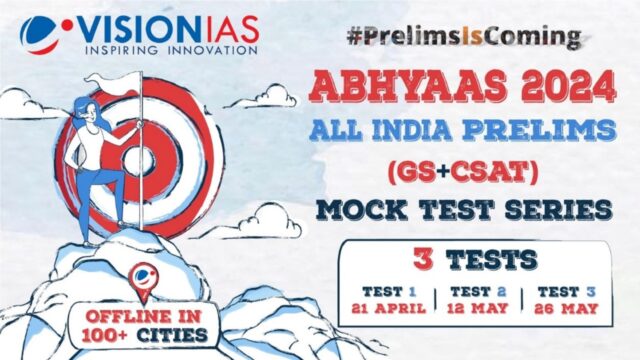
The Union Public Service Commission (UPSC) Civil Services preliminary examination is a first pivotal step for aspirants aiming to serve in various capacities within the Indian government. It consists of two papers: General Studies (GS) and the Civil Services Aptitude Test (CSAT), focusing on general awareness, problem-solving, analytical skills, and critical thinking necessary for civil service success.
The General Studies (GS) paper is renowned for its extensive syllabus, covering a wide array of subjects from Indian polity and economics to environment and ancient history. On the other hand, the CSAT focuses on comprehension, logical reasoning, and decision-making abilities essential for civil service roles.
To meet these requirements, an aspirant needs a strategic study plan that aligns with changing exam dynamics and covers all necessary topics while allowing for in-depth exploration of high-yield areas.
Practicing mock tests and their post-test analysis with feedback is a crucial component of this strategic study plan for reinforcing learned concepts and for getting accustomed to the exam’s timing and pressure. This approach is echoed in the insights shared by toppers, who often emphasize the transformative role of mock tests in their preparation journey.
Importance of Post-Test Analysis
Post-Test Analysis of Mocks reinforces the concept of test based learning approach that truly refines aspirants strategy and readiness for prelims examination. This crucial phase transforms practice sessions into a rich source of insights, providing numerous benefits such as
- Identification of Strong and Weak Areas: Pinpoints specific areas for improvement, providing a roadmap for focused study across subjects and topics.
- Clarity of Resources: Assesses study material effectiveness, highlighting any need for resources to bridge knowledge gaps, ensuring study sessions are productive and in line with UPSC standards.
Resources like VisionIAS’s Quick Revision Module (QRM) epitomize this approach by offering efficient revision tools that are designed to maximize learning outcomes effectively.
- Time Management in Exam: Reveals insights into time allocation during the test. Also, It helps aspirants to strategize question-wise timings and maximizing attempts accurately within the time limits.
- Score Enhancement: Aims at reducing errors such as incorrect OMR filling or question misinterpretation through meticulous review of mock tests, facilitating a higher score through continuous refinement.
- Last Time Revision Tool– Helps aspirants to revisit the attempted mock-tests and revise the prioritized questions and explanations. Thus enabling them to better recall.
Strategy to Analyze Mock Tests
To maximize the benefits of post-test analysis, aspirants should:
- Analyzing Answers: It is important to review every question, not just the ones marked incorrect. Understand why each correct answer is right and why the incorrect options are wrong. This helps reinforce correct information and clarifies any misunderstandings.
- Understand Mistake Patterns: Identify mistake patterns by analyzing recurring errors, whether they’re topic-specific or question-type related, to direct study efforts more efficiently.
- Refine Iteration Strategy: During in-depth post-test analysis, assess the effectiveness of your iteration approach i.e. initially tackling questions you were sure of, then proceeding to those you were somewhat sure of with educated guesses, and finally attempting additional questions using logical reasoning. Refine this strategy based on the analysis to enhance your performance in future tests.
- Evaluate Educated Guess Strategy: If you make educated guesses, review these questions to understand if guessing strategy or precision works for you. This will help solidify your understanding and improve your performance.
- Review Difficult and Unattempted Questions: Spend extra time on questions you got wrong or found difficult and try solving them again without looking at the answers or practice a few more questions from the same subject/topic as remedial tests to build confidence and improve.
- Integrate Post Test Analysis with your Plan: Use the insights gained from analysis to update your study plan. Allocate more time to weak areas and incorporate new strategies to overcome identified challenges.
- Track progress: Keep track of your performance across multiple tests to monitor your progress.
- Seek Personalized Guidance: Engage with mentors for customized strategies, areas to improve and motivation.
Abhyaas Prelims 2024 : Pathway to Success
Abhyaas Prelims 2024 offers an unparalleled opportunity for UPSC aspirants to gauge their exam readiness through its All India Prelims Mock Test Series. Designed to replicate the UPSC Prelims environment, it includes both GS and CSAT tests, scheduled across 100+ cities in India.
The test dates—21st April, 12th May, and 26th May—allow participants ample time to refine and reassess their strategies. This initiative has proven its worth, evidenced by the fact that one in every three of the top 50 successful UPSC candidates has benefited from it, marking it as a critical step on the pathway to success.
Role of Abhyaas’s Post Test Analysis in UPSC Prelims Preparation
One of the most significant benefits of Abhyaas lies in the post-test analysis. It allows aspirants to review their performance critically, identifying areas of strength and pinpointing those requiring more focus.
- All India Ranking: Offers a comparative analysis with peers nationwide, providing a realistic gauge of where aspirants stand in the larger competitive landscape.
- Performance Analysis: Delivers both macro and micro insights, including difficulty level and question’s nature wise, enabling a granular review of test-taking skills and knowledge application.
- Live Test Discussion: Facilitates an interactive discussion post-test, allowing for immediate clarification of doubts and strategies for improvement.
- Personalized Mentoring Support: Provides guidance and constructive feedback, focusing on individual strengths and weaknesses which enhances problem-solving skills, and thereby boosts confidence.
The maxim “Practice does not make perfect. Only perfect practice makes perfect” aptly highlights the essence of Abhyaas Prelims 2024. It underscores the indispensability of high-quality, focused preparation for the UPSC Prelims, made possible through detailed post-test analysis, personalized mentoring, and strategic practice.
Through Abhyaas Prelims 2024, aspirants are not just practicing; they’re perfecting their approach to one of the most challenging examinations in the country, setting a firm foundation for success.
Visit us at:
Or Call us at: 8468022022, 9019066066






























